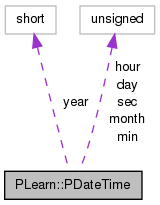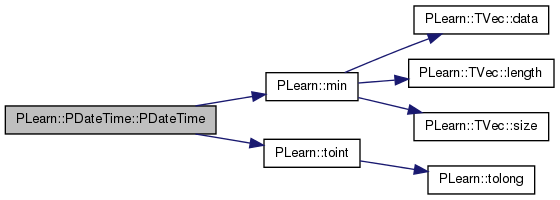|
PLearn 0.1
|
|
PLearn 0.1
|
#include <PDateTime.h>

Public Member Functions | |
| PDateTime () | |
| Create a missing date by default. | |
| PDateTime (short the_year, unsigned char the_month, unsigned char the_day) | |
| Create a date only, with time assumed to be midnight. | |
| PDateTime (int the_year, int the_month, int the_day) | |
| PDateTime (short the_year, unsigned char the_month, unsigned char the_day, unsigned char the_hour, unsigned char the_min, unsigned char the_sec) | |
| Create a full date/time. | |
| PDateTime (int the_year, int the_month, int the_day, int the_hour, int the_min, int the_sec) | |
| PDateTime (double julian_day) | |
| convert a Julian day into a PDateTime. | |
| PDateTime (string datetime) | |
| Convert a string in "YYYY/MM/DD" or "YYYY/MM/DD hh:mm:ss" into a PDateTime. | |
| bool | isMissing () const |
| Missing date/time handling. | |
| void | setMissing () |
| returns the date in the format yyyy/mm/dd hh:mm:ss | |
| string | info () const |
| bool | operator== (const PDateTime &rhs) const |
| Equality comparison. | |
| bool | operator!= (const PDateTime &rhs) const |
| bool | operator< (const PDateTime &rhs) const |
| bool | operator<= (const PDateTime &rhs) const |
| bool | operator> (const PDateTime &rhs) const |
| bool | operator>= (const PDateTime &rhs) const |
| bool | sameDay (const PDateTime &rhs) const |
| double | toJulianDay () const |
| void | incSecond (int sec_inc) |
| Increment the current date by a given number of seconds. | |
| void | incMinute (int min_inc) |
| Increment the current date by a given number of minutes. | |
| void | incHour (int hour_inc) |
| Increment the current date by a given number of hours. | |
| void | incDay (int day_inc) |
| Increment the current date by a given number of days. | |
Static Public Member Functions | |
| static PDateTime | currentLocalTime () |
| Return a PDateTime object corresponding to the current local date and time. | |
Public Attributes | |
| short | year |
| ex: 1983, 2001, -350, ... | |
| unsigned char | month |
| 1..12 | |
| unsigned char | day |
| 1..31 | |
| unsigned char | hour |
| 00..23 | |
| unsigned char | min |
| 00..59 | |
| unsigned char | sec |
| 00..61, allowing for leap seconds (!) | |
PDateTime must be a concrete class with no virtual function. Hence it MUST NOT UNDER ANY CONSIDERATION UNDER HEAVY PRISON PENALTY derive from Object. The reason that PDateTime is different from the related PDate (which stores only a date) is that some clients (e.g. SimpleDB and friends) make fairly stringent assumptions on the memory layout of a PDate, and leave no room for time. Also, a PDateTime should really be considered a "time-point", and for added precision converts itself to a double.
Definition at line 62 of file PDateTime.h.
| PLearn::PDateTime::PDateTime | ( | ) |
| PLearn::PDateTime::PDateTime | ( | short | the_year, |
| unsigned char | the_month, | ||
| unsigned char | the_day | ||
| ) | [inline] |
| PLearn::PDateTime::PDateTime | ( | short | the_year, |
| unsigned char | the_month, | ||
| unsigned char | the_day, | ||
| unsigned char | the_hour, | ||
| unsigned char | the_min, | ||
| unsigned char | the_sec | ||
| ) | [inline] |
| PLearn::PDateTime::PDateTime | ( | double | julian_day | ) |
convert a Julian day into a PDateTime.
Day 0 of the Julian calendar is about 6000 years ago... The julian day is passed as a DOUBLE, to allow specifying hours/minutes/seconds as a FRACTION of days.
Definition at line 54 of file PDateTime.cc.
References PLearn::double_to_hhmmss(), and PLearn::min().
{
int jw = (int)((julian_day - 1867216.25)/36524.25);
int jx = (int)(jw/4);
int ja = (int)(julian_day + 1 + jw - jx);
int jb = ja + 1524;
int jc = (int)((jb - 122.1)/365.25);
int jd = (int)(365.25*jc);
int je = (int)((jb - jd)/30.6001);
int jf = (int)(30.6001*je);
day = jb - jd - jf;
month = (je>13) ? je-13 : je-1;
year = (month>2) ? jc-4716 : jc-4715;
double fraction = julian_day - floor(julian_day);
int hh,mm,ss;
double_to_hhmmss(fraction,hh,mm,ss);
hour = hh;
min = mm;
sec = ss;
}

| PLearn::PDateTime::PDateTime | ( | string | datetime | ) |
Convert a string in "YYYY/MM/DD" or "YYYY/MM/DD hh:mm:ss" into a PDateTime.
The format has to match exactly.
Definition at line 77 of file PDateTime.cc.
References PLearn::min(), PLERROR, and PLearn::toint().
{
// Parse either "YYYY/MM/DD" or "YYYY/MM/DD hh:mm:ss" format
if ((date.size() == 10 || date.size() == 19) &&
date[4] == '/' && date[7] == '/' &&
(date.size() == 19? date[13] == ':' && date[16] == ':' : true)) {
year = toint(date.substr(0,4));
month = toint(date.substr(5,2));
day = toint(date.substr(8,2));
if (date.size() == 10)
hour = min = sec = 0;
else {
hour = toint(date.substr(11,2));
min = toint(date.substr(14,2));
sec = toint(date.substr(17,2));
}
}
else
PLERROR("PDateTime::PDateTime: the passed date-time string is not in "
"\"YYYY/MM/DD\" or \"YYYY/MM/DD hh:mm:ss\" format");
}

| PDateTime PLearn::PDateTime::currentLocalTime | ( | ) | [static] |
Return a PDateTime object corresponding to the current local date and time.
Definition at line 198 of file PDateTime.cc.
Referenced by PLearn::TestClientCommand::run().
{
time_t current;
tm* ptr;
time(¤t);
ptr = ::localtime(¤t);
return PDateTime(ptr->tm_year + 1900, ptr->tm_mon + 1, ptr->tm_mday,
ptr->tm_hour, ptr->tm_min, ptr->tm_sec);
}

| void PLearn::PDateTime::incDay | ( | int | day_inc | ) |
Increment the current date by a given number of days.
Definition at line 153 of file PDateTime.cc.
References PLASSERT, and PLERROR.
{
PLASSERT( day_inc >= 0 );
int new_day = int(day) + day_inc;
int max_day = 31;
if (month == 2) {
if (year < 1900 || year > 2100)
PLERROR("In PDateTime::incDay - This code is probably not going to"
" work for year %d", int(year));
max_day = year % 4 == 0 ? 29 : 28;
} else if (month == 4 || month == 6 || month == 9 || month == 11)
max_day = 30;
if (new_day <= max_day) {
day = (unsigned char) new_day;
return;
}
// We need to switch to next month.
PLASSERT( max_day >= int(day) );
int days_to_next_month = max_day - int(day) + 1;
month++;
if (month == 13) {
// We need to switch to next year.
year++;
month = 1;
}
day = 1;
incDay(day_inc - days_to_next_month);
}
| void PLearn::PDateTime::incHour | ( | int | hour_inc | ) |
| void PLearn::PDateTime::incMinute | ( | int | min_inc | ) |
Increment the current date by a given number of minutes.
Definition at line 131 of file PDateTime.cc.
References PLearn::min().
{
int new_min = int(min) + min_inc;
int hour_inc = new_min / 60;
min = (unsigned char) (new_min % 60);
incHour(hour_inc);
}

| void PLearn::PDateTime::incSecond | ( | int | sec_inc | ) |
| string PLearn::PDateTime::info | ( | ) | const |
Definition at line 185 of file PDateTime.cc.
References PLearn::min(), PLearn::right(), slash, and PLearn::tostring().
Referenced by PLearn::operator<<().
{
return tostring(year)+ slash+
right(tostring(int(month)), 2, '0') + slash+
right(tostring(int(day)), 2, '0') + " "+
right(tostring(int(hour)), 2, '0') + ":"+
right(tostring(int(min)), 2, '0') + ":"+
right(tostring(int(sec)), 2, '0');
}


| bool PLearn::PDateTime::isMissing | ( | ) | const |
Missing date/time handling.
Definition at line 102 of file PDateTime.cc.
Referenced by PLearn::datetime_to_double().

Definition at line 118 of file PDateTime.h.
{
return ! (*this == rhs);
}
Definition at line 122 of file PDateTime.h.
References PLearn::datetime_to_double().
{
double datetime_to_double(const PDateTime& t); // declare the function
return datetime_to_double(*this) < datetime_to_double(rhs);
}

Definition at line 127 of file PDateTime.h.
{
return *this == rhs || *this < rhs;
}
Definition at line 131 of file PDateTime.h.
{
return ! (*this <= rhs);
}
Definition at line 135 of file PDateTime.h.
{
return ! (*this < rhs);
}
| void PLearn::PDateTime::setMissing | ( | ) |
returns the date in the format yyyy/mm/dd hh:mm:ss
Definition at line 110 of file PDateTime.cc.
| double PLearn::PDateTime::toJulianDay | ( | ) | const |
Convert a PDateTime into a Julian day. See http://quasar.as.utexas.edu/BillInfo/JulianDatesG.html (if still existing...) for details.
Definition at line 210 of file PDateTime.cc.
References PLearn::hhmmss_to_double(), PLearn::min(), and PLERROR.
Referenced by PLearn::delta_seconds(), PLearn::JulianizeVMatrix::getNewRow(), and PLearn::operator-().
{
if (year < 1582)
PLERROR("toJulianDay works safely only for year > 1581 (%d)", year);
double fraction = hhmmss_to_double(hour,min,sec);
int jy = (month>2) ? year : year-1;
int jm = (month>2) ? month : month+12;
int ja = (int)(jy/100);
int jb = (int)(ja/4);
int jc = 2 - ja + jb;
int je = (int)(365.25*(jy + 4716));
int jf = (int)(30.6001*(jm + 1));
return jc + day + je + jf - 1524 + fraction;
}


| unsigned char PLearn::PDateTime::day |
1..31
Definition at line 67 of file PDateTime.h.
Referenced by PLearn::datetime_to_double(), PLearn::double_to_datetime(), operator==(), and sameDay().
| unsigned char PLearn::PDateTime::hour |
00..23
Definition at line 68 of file PDateTime.h.
Referenced by PLearn::datetime_to_double(), PLearn::double_to_datetime(), and operator==().
| unsigned char PLearn::PDateTime::min |
00..59
Definition at line 69 of file PDateTime.h.
Referenced by PLearn::datetime_to_double(), PLearn::double_to_datetime(), and operator==().
| unsigned char PLearn::PDateTime::month |
1..12
Definition at line 66 of file PDateTime.h.
Referenced by PLearn::datetime_to_double(), PLearn::double_to_datetime(), operator==(), and sameDay().
| unsigned char PLearn::PDateTime::sec |
00..61, allowing for leap seconds (!)
Definition at line 70 of file PDateTime.h.
Referenced by PLearn::datetime_to_double(), PLearn::double_to_datetime(), and operator==().
| short PLearn::PDateTime::year |
ex: 1983, 2001, -350, ...
Definition at line 65 of file PDateTime.h.
Referenced by PLearn::datetime_to_double(), PLearn::double_to_datetime(), operator==(), and sameDay().
 1.7.4
1.7.4